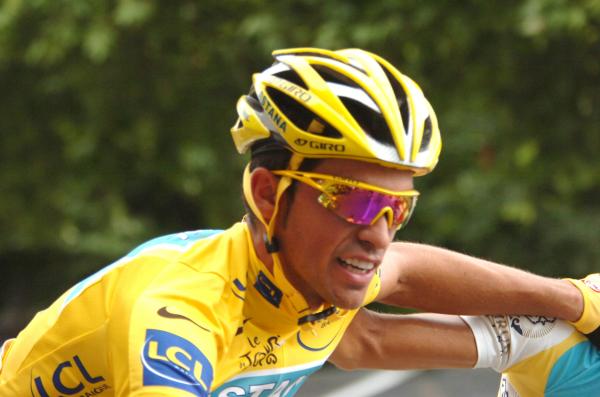Vaughters wants fairness in Contador doping case
"Let science sort this out" says Garmin-Transitions boss

Alberto Contador's positive test for Clenbuterol has put the Spaniard firmly in the dock as he waits to find out his fate. However Jonathan Vaughters, team director of Garmin-Transmitions and strong anti-doping advocate, has called for new steps to be taken to ensure that riders are treated fairly, and wants a stronger emphasis on a judicial process as sophisticated as the drug testing cyclists face.
Alberto Contador tests positive for clenbuterol
Alberto Contador suspended over traces of clenbuterol from Tour de France test
Contador's contaminated food: excuse or possibility?
Contador: Food contamination or political victim?
Riis believes in Contador's innocence
Contador's scientific expert De Boer details defense
Bruyneel speaks out in support of Contador
Experts split on cause of Contador's Tour de France doping positive
"The sad part about this one is that no matter what the science eventually shows the headlines have been made. It's too bad that this process could not have occurred in a way that you had a final determination of guilt or innocent and then something was released. That's something that needs to be looked at. It's the headline that will be in the memory of the general public and it will always supercede the reality and the science, and that's sad. I don't think that's fair," Vaughters told Cyclingnews.
"In any of these cases you've got to let science do its work. The general public will not be willing or have the time to look into the facts. It's a headline, it's a twenty second blurb, it's a 140 character Tweet and their minds are made up when in fact it's a very complex story."
Contador came out fighting this morning at a press conference in his home town of Pinto, Spain, claiming that he was the victim of contaminated meat and that the lab that tested him found no traces of the drug before he ingested the food.
However, claims from within the German media since have countered Contador's defence. They argue that the Spaniard may have withdrawn Clenbuterol-contaminated blood before the Tour de France, replaced the blood during the rest day on July 21, and subsequently tested positive for the drug.
Regardless of these claims, Vaughters is certain that although the sport has taken huge measures to clean up its act in recent years, the leap forward in sophisticated and targeted testing may have left gaps between riders, labs and the sports governing bodies.
"We're going to have to let the science sort this one out. If labs find evidence of a blood transfusion, then we need to applaud the sensitivity of the lab - and be glad that fairness was upheld. If, instead, science determines it was a contaminated food source, we need to make sure the athlete's reputation is restored. " Vaughters said.
Get The Leadout Newsletter
The latest race content, interviews, features, reviews and expert buying guides, direct to your inbox!
"Logically speaking, the reason labs are set up is to find extremely small quality of drugs is to prevent people taking the drugs.
"At the end of the day this has to be treated just like you'd treat a civil legal case by looking at all the evidence at hand and putting it into context in order to come up with a verdict. There should be a greater degree of judicial oversight to make sure the final result is correct is fair. That's what everyone wants, fairness."
Whether Contador will receive a two-year suspension or be cleared to race, Vaughters, who spends a large sum of his team's finances on independent testing, believes that the judicial steps within the sport need assessing due to the complexities that surround professional cycling.
"Cycling is at an abnormally large risk compared to other sports because in cycling you're constantly on the road, eating different food, at different hotels, your exposure to possible mistakes and errors is very high.
"There's a really high risk and it's very difficult to mitigate that risk on an anti-doping side of things. There are zero tolerance rules, but at the same time it's going to be very easy for supplements and food items to be contaminated."
So has the testing within the sport gone too far or rather has the testing within cycling become so sophisticated that the judicial processes behind it and projects like the biological passport are struggling to keep up?
"I don't think that testing has gone too far, but perhaps there's need to be more process and investigate work that surrounds anti-doping work. I'm supportive of labs that stop athletes from trying to beat the system, but at the same time there needs to be a judicial and investigative process.
"All the athletes and myself want isn't to find out if people have ever taken any kind of medicine or drug in their entire life, but to ensure fair competition. So as long as you feel that the athlete isn't getting an unfair advantage I don't think there's a problem. The question is whether the results of the Tour de France were fundamentally changed by this or not."
Daniel Benson was the Editor in Chief at Cyclingnews.com between 2008 and 2022. Based in the UK, he joined the Cyclingnews team in 2008 as the site's first UK-based Managing Editor. In that time, he reported on over a dozen editions of the Tour de France, several World Championships, the Tour Down Under, Spring Classics, and the London 2012 Olympic Games. With the help of the excellent editorial team, he ran the coverage on Cyclingnews and has interviewed leading figures in the sport including UCI Presidents and Tour de France winners.
